|
|
Introduction
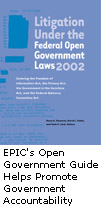 The Freedom of Information Act establishes a legal right for individuals to obtain records in the possession of government agencies. The FOIA is critical for the functioning of democratic government because it helps ensure that the public is fully informed about matters of public concern. The FOIA has helped uncover fraud, waste, and abuse in the federal government. It has become particularly important in the last few years as the government has tried to keep more of its activities secret. The Freedom of Information Act establishes a legal right for individuals to obtain records in the possession of government agencies. The FOIA is critical for the functioning of democratic government because it helps ensure that the public is fully informed about matters of public concern. The FOIA has helped uncover fraud, waste, and abuse in the federal government. It has become particularly important in the last few years as the government has tried to keep more of its activities secret.
A hallmark of the new surveillance measures proposed by various government agencies is their disregard for public accountability. As the government seeks to expand its power to collect information about individuals, it increasingly hides that surveillance power behind a wall of secrecy. Congress has long recognized this tendency in the Executive Branch, and sought to limit government secrecy by creating legal obligations of openness under the FOIA and the Privacy Act of 1974. EPIC has used these open government laws aggressively to enable public oversight of potentially invasive surveillance initiatives.
Public access through the FOIA not only allows for a more informed public debate over new surveillance proposals, but also ensures accountability for government officials. Public debate fosters the development of more robust security systems and leads to solutions that better respect the nation's democratic values. EPIC's FOIA litigation activity over the past year has resulted in disclosure of information about several government surveillance programs. The EPIC FOIA Gallery highlights some of the most significant documents we obtained this year.
|
|
|
|
|
Total Information Awareness Contractors Revealed
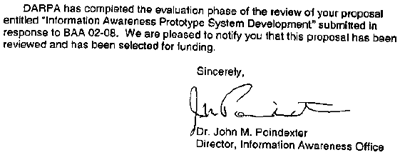
The Department of Defense attempted to block the release of documents concerning the controversial Total Information Awareness program by imposing unprecedented fees on EPIC, despite EPIC's status as a public interest research organization. EPIC challenged the fee determination, and a federal district court ruled for EPIC. The court held that EPIC is entitled to "preferred fee status" under the FOIA and ordered the Pentagon to "expeditiously" process our year-old request for information concerning John Poindexter and the Information Awareness Office. This first release of documents concerns letters that Poindexter sent to potential contractors either approving or rejecting funding for their projects under the Total Information Awareness program. The documents reveal the names of companies and universities that requested contracts, as well as actual dollar amounts that the federal government plans to allocate for the development of this new system of national surveillance.
|
|
|
Internal FBI Guidance on the Foreign Intelligence Surveillance Act
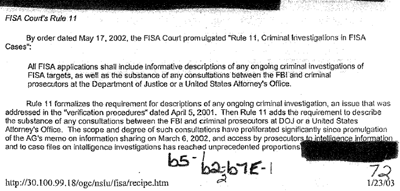
EPIC obtained this internal FBI memo, which answers the question, "What do I have to do to get a FISA warrant?" The memo discusses the definition of a "foreign power" and the standard for initiating surveillance of a U.S. person. It also addresses changes made by the Attorney General's March 2002 information sharing guidelines that brought down the wall between law enforcement and intelligence operations in the use of FISA. The memo states that, "Access by prosecutors to intelligence information and to case files on intelligence investigations has reached unprecendented proportions." |
|
|
|
Memo Reveals FBI's Legal Mistakes in Using the Foreign Intelligence Surveillance Act
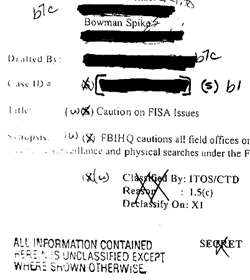
This internal FBI memo reveals numerous mistakes that agents made when using FISA. For instance, they illegally videotaped suspects, intercepted e-mails without court permission, recorded the wrong phone conversations, and allowed electronic surveillance operations to run beyond their legal deadline, during sensitive terrorism investigations. The existence of the memo was first revealed in documents that EPIC obtained through FOIA litigation.
|
|
|
FBI's Carnivore System Hampered by Technical Flaws
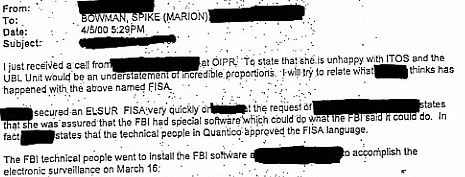
An FBI anti-terrorism investigation involving Osama bin Laden was hampered by technical flaws in the Bureau's controversial Carnivore Internet surveillance system. The incident, which occurred in March 2000, is described in FBI documents obtained under court order by EPIC. A written report describes the incident as part of a "pattern" indicating "an inability on the part of the FBI to manage" its foreign intelligence surveillance activities. |
|
|
Immigration & Naturalization Service Buys National ID files from ChoicePoint
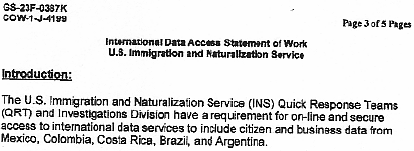
These documents, obtained by EPIC through a FOIA request, show that the Immigration and Naturalization Service purchased personal information from the national ID databases of several Latin American countries. These databases were constructed by ChoicePoint, an Atlanta-based profiling company that has also sold information to the FBI. ChoicePoint has a contract with INS to provide citizen registry, motor vehicle, and other information for Brazil, Argentina, Mexico, Columbia, and Costa Rica.
|
|
|
Transportation Security Administration Discloses Model for Proposed Passenger Profiling Systems
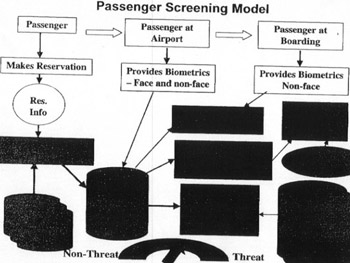
This document, obtained from the Transportation Security Administration, is part of a technology briefing that the National Aeronautics and Space Administration used to showcase technology that could be used to screen airline passengers. NASA gave this briefing to Northwest Airlines, who were one the original developers of the first passenger profiling systems in 1996. The document describes a possible passenger profiling model that incorporates biometric identification and extensive data mining of unknown government and private sector databases to develop profiles and identify potentially "risky" travelers. Although NASA was not selected to develop the passenger profiling system, the model gives an indication of the type of system that the TSA is seeking to develop.
|
|
|
Helicopter Surveillance Used to Monitor Peaceful Public Protests
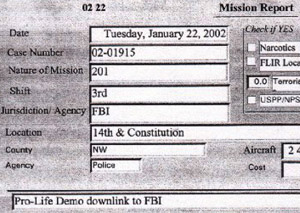 Pursuant to a FOIA request from EPIC, the Park Police disclosed logs of "mission reports" showing when and where a surveillance camera installed on its helicopter was used from April 2000 to May 2002. These logs show that the camera was mainly used to conduct surveillance of public protests. Recordings (or "downlinks") were made of public events ranging from the Million Family March to the Anti-World Bank/IMF protests. The records were also transmitted to law enforcement agencies, including one instance where they were shared with the FBI. The remote surveillance of public demonstrators raises important First Amendment issues and underscores the need for close public scrutiny. EPIC launched a new Web site, Observing Surveillance, to visually document the presence of surveillance cameras in the Nation's Capital. Pursuant to a FOIA request from EPIC, the Park Police disclosed logs of "mission reports" showing when and where a surveillance camera installed on its helicopter was used from April 2000 to May 2002. These logs show that the camera was mainly used to conduct surveillance of public protests. Recordings (or "downlinks") were made of public events ranging from the Million Family March to the Anti-World Bank/IMF protests. The records were also transmitted to law enforcement agencies, including one instance where they were shared with the FBI. The remote surveillance of public demonstrators raises important First Amendment issues and underscores the need for close public scrutiny. EPIC launched a new Web site, Observing Surveillance, to visually document the presence of surveillance cameras in the Nation's Capital.
|
|
|